| Srl | Item |
| 1 |
ID:
086654
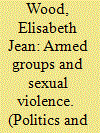

|
|
|
|
|
| Publication |
2009.
|
| Summary/Abstract |
This article explores a particular pattern of wartime violence, the relative absence of sexual violence on the part of many armed groups. This neglected fact has important policy implications: If some groups do not engage in sexual violence, then rape is not inevitable in war as is sometimes claimed, and there are stronger grounds for holding responsible those groups that do engage in sexual violence. After developing a theoretical framework for understanding the observed variation in wartime sexual violence, the article analyzes the puzzling absence of sexual violence on the part of the secessionist Liberation Tigers of Tamil Eelam of Sri Lanka.
|
|
|
|
|
|
|
|
|
|
|
|
|
|
|
|
| 2 |
ID:
086650
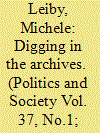

|
|
|
|
|
| Publication |
2009.
|
| Summary/Abstract |
This article explores the methodological obstacles to research on wartime sexual violence and the extent to which they can be overcome with archival research. It discusses issues of concept formation, counting victims of human rights abuse, and coding violations. It compares figures from the Peruvian Truth and Reconciliation Commission's final report, an analysis of the Commission's published materials, and an analysis of the primary documents and finds that (1) the number of reported cases of sexual violence is significantly higher than the 538 cited by the Commission, (2) men were more often the targets of sexual violence than previously thought, and (3) sexual humiliation and sexual torture were common practices during the war
|
|
|
|
|
|
|
|
|
|
|
|
|
|
|
|
| 3 |
ID:
086652
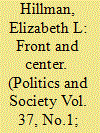

|
|
|
|
|
| Summary/Abstract |
Military-on-military sexual violence-the type of sexual violence that most directly disrupts operations, harms personnel, and undermines recruiting-occurs with astonishing frequency. The U.S. military has responded with a campaign to prevent and punish military-on-military sex crimes. This campaign, however, has made little progress, partly because of U.S. military law, a special realm of criminal justice dominated by legal precedents involving sexual violence and racialized images. By promulgating images and narratives of sexual exploitation, violent sexuality, and female subordination, the military justice system has helped to sustain a legal culture that reifies the connection between sexual violence and authentic soldiering.
|
|
|
|
|
|
|
|
|
|
|
|
|
|
|
|
| 4 |
ID:
086647
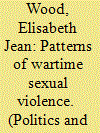

|
|
|
|
|
| Publication |
2009.
|
| Summary/Abstract |
Sexual violence incuding rape, sexual torture, sexual slavery, and forced abortion is a common form of violence against some of the most vulnerable civilians during war. As a result of the mobilization by women's groups advocating prosecution of rape in Bosnia and Rwanda, international legal authorities now prosecute various forms of sexual violence as war crimes, as crimes against humanity, and, in some contexts, as genocide.
|
|
|
|
|
|
|
|
|
|
|
|
|
|
|
|
| 5 |
ID:
086649
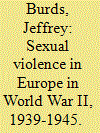

|
|
|
|
|
| Publication |
2009.
|
| Summary/Abstract |
Focusing in particular on the German-Soviet war in the East, this article explores variations in patterns of sexual violence associated with armed forces in Europe during and immediately after World War II. Besides soldier violence perpetrated against civilian populations, a significant role was also played by irregular forces: most notably, by partisan guerrillas and civilian vigilantes. Ethnic nationalist partisan forces perpetrated especially brutal sexual violence against women and girls of "enemy" nationalities. Likewise, after liberation civilian reprisals were fairly common throughout Europe against so-called "sexual collaborators"-that is, against women excoriated for providing "sexual comfort" to the enemy during the German occupation.
|
|
|
|
|
|
|
|
|
|
|
|
|
|
|
|
| 6 |
ID:
086645
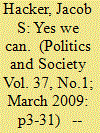

|
|
|
|
|
| Publication |
2009.
|
| Summary/Abstract |
What are the prospects for meaningful reform of U.S. health care? To answer this question requires understanding why previous reform efforts (and in particular the 1993 Clinton health plan) failed-the combination of deep structural biases against large-scale public provision and the inherited constraints posed by the rise of employment-based insurance. Generally, the context is more favorable today than it was fifteen years ago. But the prospects for change hinge on learning the right lesson of history: Politics comes first. Putting politics first means avoiding the overarching mistake of the Clinton reformers: envisioning a grand policy compromise rather than hammering out a real political compromise. It also means addressing the inevitable fears of those who believe they are well protected by our eroding employment-based framework. And it means premising political strategies on the contemporary realities of hyperpolarized politics, rather than wistfully recalled images of the bipartisan politics of old.
|
|
|
|
|
|
|
|
|
|
|
|
|
|
|
|